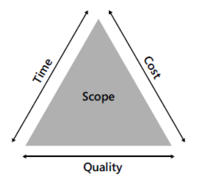The Critical Path Method (CPM) in Project Management
According to the Project Management Institute (PMI), project management is the application of knowledge, skills, tools and techniques to project activities in order to meet project requirements and objectives.[1] The challenging task of managing projects can be supported by an operation reserach technique called the Critical Path Method (CPM). The CPM is a mathematically-network based algorithm in which can be used for planning, scheduling and monitoring project progress. [2]
The technique developed in late 1950s uses information from a work breakdowm structure (WBS) in a network representation to display interrelationships and dependencies between project activities that must be accomplished to complete a project. The technique is used for analyzing projects by determining the longest sequence of tasks through a project network, called the critical path . This determines the shortest possible time to complete the project as well as which tasks or activities should be of extra focus in the project. Furthermore, based on acquired information from the CPM, the next question could be if it is possible to shorten the project in order to finish within certain deadline. [2][3][4]
The article includes brief introduction and background of the CPM method in project management will be introduced together with the methodology behind it. An example of the method is carried out step-by-step and a solution presented. Following is a discussion on time-cost trade offs in project acceleration together with an example of project crashing. Lastly, the article ends on a brief summary on the benefits and limitation of the CPM method within the field of project management.
Contents |
Overview
Introduction
Organizations across the world and different sectors have been embracing project management as a way to improve project results.[5] The increased awareness and acceptance indicates that the application of knowledge, skills, tools and techniques can have a significant impact on project results. [1]"A project is a sequence of unique, complex, and connected activities that have one goal or purpose and that must be completed by a specific time, within budged and according to specification."[6]

fafa
Background
Application and use
Methodology
The Project Network
CPM Example
Consdideration of Time-Cost trade-offs
Project Crashing Example
Once the critical path and timeing of activities has been identified - the next question is if it is possible to shorten the project in order to finish within a certein deadline.
Here is maybe possible to do an example of project crashing.
Benefits of CPM in project planning
Limitations of CPM
References
- ↑ 1.0 1.1 Project Management Institute. (2008). A Guide to the Project Management Body of Knowledge. 4th Edition. p. 6. USA. ISBN 9781933890517
- ↑ 2.0 2.1 Larson, E. W & Gray, C. F. (2014). Project Management - The Managerial Process. 6th edition, p. 161. USA: NY. ISBN 9781259010705
- ↑ Newbold, R.C. (1998). Project Management in the Fast Lane – Applying the Theory of Constraint. USA: FL. ISBN 9781498738064
- ↑ Larsen, J. & Clausen, J., (2009). Course material in Networks and Integer Programming Supplementary at DTU - Notes to Networks and Integer Programming. Retrieved from campusnet.dtu.dk
- ↑ Project Management Institute. (2010). The Value of Project Management. Available Online Version
- ↑ Wysocki, R. K., (2009). Effective Project Management: Traditional, Agile, Extreme. Fifth Edition. USA: IN. ISBN 9780470423677. Available Online
- ↑ Robert K. Wysocki, 2009, Effective Project Management: Traditional, Agile, Extreme. Fifth Edition. Indianapolis. [Available online on Google books]